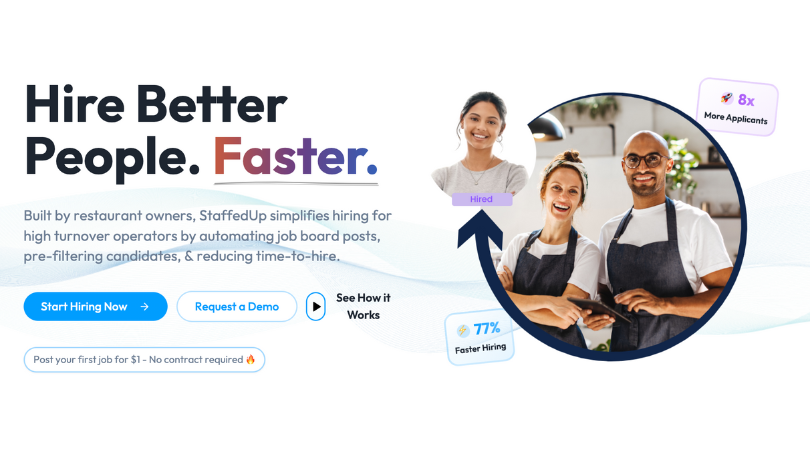Introduction
The hospitality industry is all about people. Whether you run a restaurant, hotel, bar, or catering business, your employees shape every guest interaction. They are the ones greeting guests at the door, preparing meals, serving drinks, or handling problems when they arise. In short, your staff are your business.
That’s why hospitality staffing is one of the most important parts of running a successful operation. You could have the best menu, location, or marketing plan, but if you don’t have the right employees, everything else will fall apart. On the other hand, a strong team can turn even a small, local business into a place people love and remember.
This guide will explain how to hire the right employees for hospitality jobs, what traits to look for, and how to create a staffing process that reduces turnover. We’ll also cover tips for training, onboarding, and using tools like applicant tracking systems to make hiring easier.
By the end, you’ll have a clear understanding of how to build and keep a great hospitality team.
What Is Hospitality Staffing?
Hospitality staffing refers to the process of recruiting, hiring, and retaining employees in restaurants, hotels, bars, resorts, and other service-focused businesses. It covers every role in your operation, from front-of-house servers and bartenders to back-of-house cooks, cleaners, and managers.
Unlike other industries, hospitality depends heavily on personality traits. Skills like carrying plates or using a booking system can be taught. But qualities like patience, empathy, and sincerity are harder to train. That’s why hiring in hospitality is often less about resumes and more about finding people with the right temperament.
Why Hospitality Staffing Matters
Hiring the right people does more than fill shifts. It directly impacts your reputation, profits, and ability to grow. Here’s why staffing is so important:
Guest Experience
Guests remember how they were treated. According to PwC research, 73% of customers say customer experience is an important factor in their buying decisions. Friendly, attentive employees can turn a casual visitor into a loyal customer.
Employee Retention
Hospitality is known for high turnover. In fact, the U.S. Bureau of Labor Statistics shows turnover rates in hospitality are often double the average across industries. Strong staffing practices help reduce this by hiring people who fit your culture and by supporting them once they’re on the team.
Brand Reputation
Online reviews often mention staff directly. Comments like “The waiter was so kind” or “The bartender was rude” can make or break your business on platforms like Yelp, Google, and TripAdvisor. Many restaurants even ask for comments to include servers name. This doesn’t always end up positively through.
Operational Stability
When staffing is unstable, managers scramble to cover shifts, and service quality suffers. A stable team saves time, cuts training costs, and improves consistency.
Traits That Make a Great Hospitality Employee
When you’re reviewing applications, don’t just look for technical skills. Pay close attention to natural traits (aka soft skills). These qualities are hard to teach but vital in hospitality staffing:
- Empathy – Staff who can understand how guests feel and respond with care.
- Teamwork – Employees who work well with others, especially in high-pressure environments.
- Patience – Staying calm with upset guests or long lines.
- Sincerity – Genuine warmth and honesty in interactions.
- Adaptability – The ability to adjust when things don’t go as planned.
- Communication – Clear and respectful speaking and listening skills.
👉 Example: A server with no prior restaurant experience but a friendly personality and eagerness to learn may end up being more valuable than a veteran server with bad habits.
Experience vs. Trainability
One of the biggest hiring decisions is whether to value experience or trainability more.
The Case for Experience
- Experienced hires may require less training.
- They can handle busy shifts faster.
- They bring industry knowledge you can tap into.
The Case for Trainability
- Experienced staff may bring habits that don’t match your standards.
- Newer workers can be trained to your system from scratch.
- Trainable employees often stay longer, since they feel invested in your business.
📌 Tip: During interviews, ask scenario-based questions like: “How would you handle a guest who says their food is wrong?” Their answers will show both their natural traits and how much training they may need.
Building a Hiring Process That Works
To improve hospitality staffing, you need a clear process. A well-defined system helps you attract better candidates, save time, and reduce turnover.
Step 1: Define Your Ideal Candidate
Make a list of the traits and skills your best employees share. Use this as a benchmark for new hires.
Step 2: Write Clear Job Descriptions
A strong job descrition includes:
- Role and responsibilities.
- Pay and benefits.
- Schedule expectations.
- Key personality traits needed.
Step 3: Post Jobs Where Candidates Look
- Your website’s careers page.
- Social media platforms like Facebook and Instagram.
- Local job boards and hospitality-focused sites like StaffedUp.
Step 4: Use an Applicant Tracking System (ATS)
An ATS like StaffedUp helps you:
- Collect and organize applications.
- Filter by experience and keywords.
- Communicate with candidates faster.
Step 5: Improve the Interview Process
- Ask about past guest interactions.
- Use role-play exercises (like handling a complaint).
- Look beyond resumes for natural personality traits.
Common Mistakes in Hospitality Staffing
Even experienced managers make errors during hiring. Avoid these common mistakes:
- Being too vague. If your rules and expectations aren’t clear, employees won’t know what to do.
- Relying only on experience. A resume doesn’t always predict performance. Real tested skills are needed to succeed.
- Skipping reference checks. Talking to past employers helps confirm traits.
- Failing to train managers. Managers need training to interview fairly and consistently.
- Not updating hiring processes. Staffing strategies should evolve as your business grows. This doesn’t mean complicating the process, keep it simple & streamlined.
Learning From Your Best Employees
Your top performers are the best guide for future hiring. Analyze your team by asking:
- Who are my strongest employees?
- What traits do they share?
- How much experience did they have when hired?
- How quickly did they adapt to my business?
By creating a “success profile,” you’ll know what to prioritize when hiring new staff.
Improving Retention After Hiring
Staffing doesn’t end with a job offer. To reduce turnover, you need a plan to keep employees engaged and satisfied.
Onboarding
- Provide a clear employee handbook with rules and expectations.
- Assign mentors or trainers to new hires.
- Offer orientation that explains your mission and culture.
Training
- Train for both skills (like taking orders) and soft skills (like communication).
- Offer ongoing training sessions to improve performance.
Work Culture
- Encourage open communication between staff and managers.
- Recognize top performers with rewards or praise.
- Schedule fairly to prevent burnout.
👉 Case Study: A small café in Chicago reduced turnover by 30% after introducing a mentorship program where new hires shadowed senior staff for their first two weeks.
Technology in Hospitality Staffing
Modern hiring is no longer just paper applications. Digital tools can make staffing easier.
- Applicant Tracking Systems (ATS): Organize and review applications in one place.
- Scheduling Apps: Help staff see their shifts, request time off, and swap schedules. Companies we work with tend to use 7shifts.
- Online Training Platforms: Provide consistent onboarding and skills training.
Investing in technology may cost money upfront, but it saves time, reduces mistakes, and improves employee satisfaction.
Future Trends in Hospitality Staffing
Hospitality hiring is changing quickly. Here are some trends to watch:
- More digital hiring tools like mobile job applications.
- Focus on diversity to build stronger teams.
- Flexible schedules as younger workers seek work-life balance.
- Increased training to reduce turnover and improve guest experiences.
Resources for Hospitality Staffing
For more information, check these helpful resources:
- U.S. Department of Labor – Workplace laws and labor rights.
- StaffedUp – Best hiring software to help you build a qualified team, fast.
- National Restaurant Association – Industry insights and research.
- OSHA – Health and safety standards for food service businesses.
Conclusion
Hospitality staffing is one of the most important parts of running a successful business. The employees you hire shape every guest interaction and directly impact your reputation and profits.
By focusing on traits like empathy, patience, and teamwork, weighing experience against trainability, and building a strong hiring process, you’ll attract better candidates and keep them longer. Pair this with onboarding, training, and modern tools, and you’ll have a team that supports your business goals.Hiring the right staff may take effort, but it’s one of the best investments you can make. A strong team not only keeps guests happy but also builds loyalty, reduces turnover, and creates long-term success for your restaurant or hospitality business.



